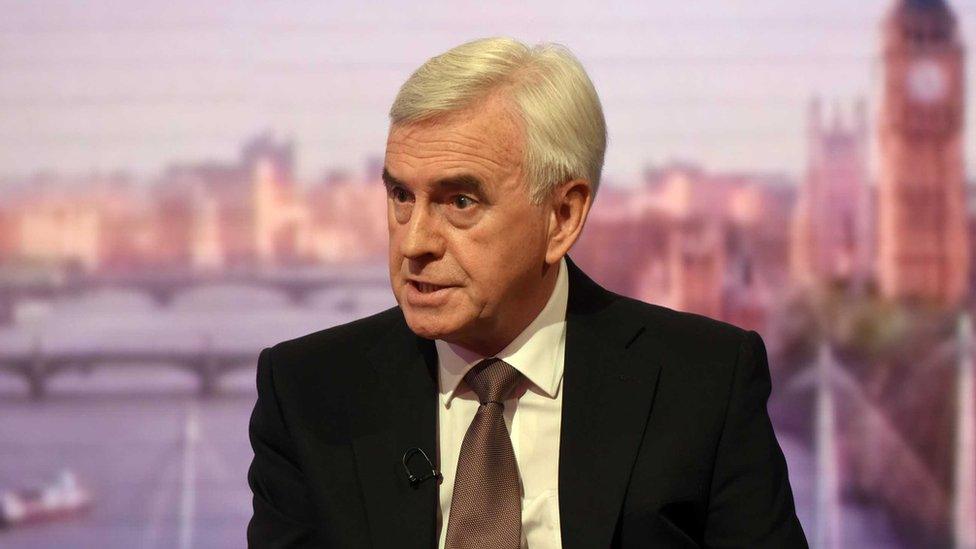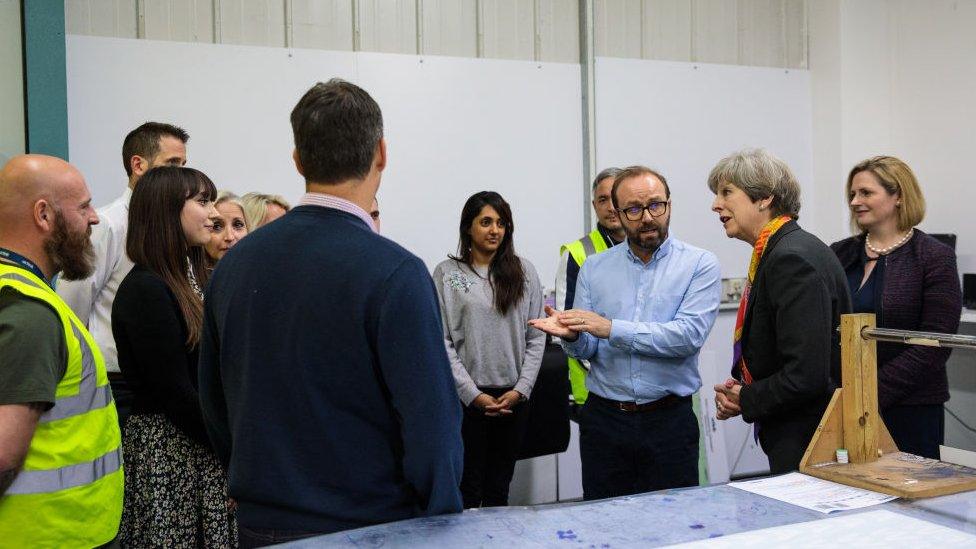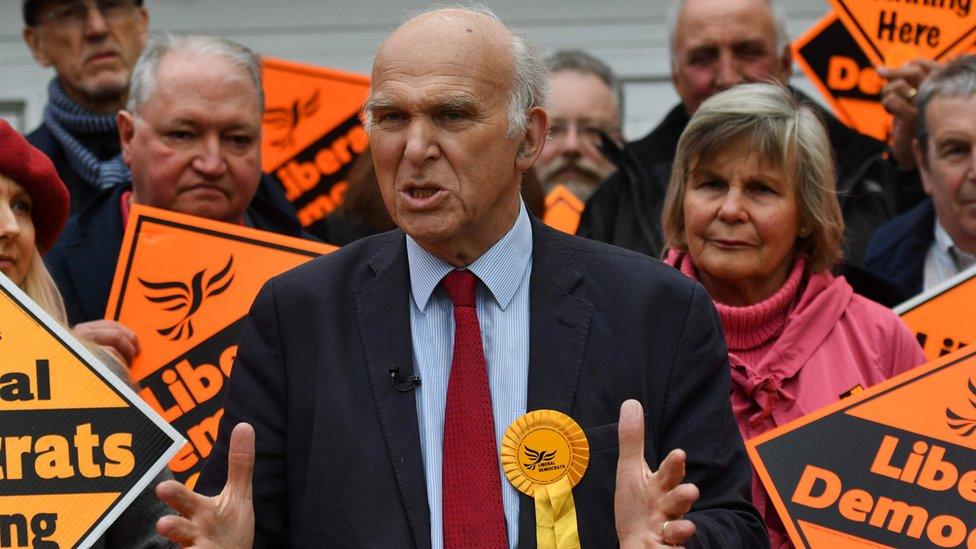Tax is only one part of the deal for those in work
- Published
- comments

Shadow chancellor, John McDonnell, wants to talk about "real" pay.
How much tax you pay, and what for, is one of the most fundamental relationships between the state and the citizen.
It was John Locke who said that "governments cannot be supported without great charge".
This weekend Labour pledged that people earning under £80,000 would not face increases in income tax and national insurance.
And that there would be no rises in the standard rate of VAT.
The Liberal Democrats said that they would increase income and dividend taxes by 1p in every pound, and that the money raised would be used to support the NHS in England, with the devolved assemblies in Scotland, Wales and Northern Ireland left to choose where any extra funding is spent.
As I have written before, the Tories are looking to "reduce the tax burden" although it is not yet clear if the aspiration will fit into a neat manifesto promise.
Tax pledges make for simple headlines.
But a more complicated debate - which could well be as important for voters - is taking shape.
And it is not just about the income you receive from work - and the tax you pay on it.
It is about the quality of that work.
Better shape up
Last week, the Conservative peer and trade minister, Lord Price, published a book called Fairness For All.
In itself, not that headline grabbing. But the fact that the book has the full blessing of Number 10, and was published in the middle of an election campaign, ups its significance.
And once again reveals that government and business have - since the financial crisis - become uneasy bedfellows.

The Prime Minister has said ordinary working class families have borne the brunt of sacrifices
In his book, Lord Price, the former head of Waitrose, argues that firms need to shape up and look at how they treat their workforces.
He admits that trust has broken down and that issues such as mega-high pay have poisoned the debate about profit-making firms.
This is an issue central to the "offer" Theresa May has made to the electorate.
And therefore one the Prime Minister is presumably happy to be tested on.
Mrs May has spoken about stagnating pay and said that the economic "sacrifices" made since the financial crisis have not been borne by "the wealthy" but by "ordinary working class families".
Quality jobs
On Tuesday, Matthew Taylor, the former special advisor to Tony Blair and the person tasked by Number 10 to look at the changing world of work from zero-hours contracts onwards, will make a speech in which he will argue for a fundamental change in the attitude to employment.
Yes, Britain has been good at creating jobs.
But has quality been sacrificed for quantity?
And what rights do we have to a "good" job - however elastic such a definition may be?
Lord Price told me this was not a "party political" argument.
And to an extent he is right.
Happy workers
All the major parties have spoken about the need to reform work, whether its banning zero hours contracts (Labour) or "transparency over pay" (the Liberal Democrats).
On Sunday John McDonnell, the shadow chancellor, said that "families across the country" have seen real pay (adjusted for inflation) fall by more than at any time since the industrial revolution.
And he said that it's all very well for Mrs May to talk about a "fairer Britain" and a strong economy, but it is the Conservative government which has allowed the problem to fester.
Lord Price admitted to me that there needed to be change - but said that persuasion rather than compulsion was the best way forward.
He argues that the "happiness" and satisfaction of employees is the key to increasing productivity, profitability and economic wealth.
"Business has to recognise that instead of taking a short term view or quarterly profits and rewarding shareholders, a long term view needs to be taken of what we need as we move from an industrial era to the digital era," he said.
Embrace business
"What I don't want to do - what I think would be wrong for the economy - is for any government to go to war with business, to make business afraid of them," said Lord Price.
"We have got to embrace business now - working collaboratively with business as a force for good."

Vince Cable says the Liberal Democrats want more employee engagement, fair contracts and transparency over pay.
This is not necessarily about being "anti" or "pro" business, Lord Price insisted.
And he strongly denied the claim by Iain Conn, the chief executive of Centrica which owns British Gas, that some people at the heart of government "just don't believe in free markets".
Although, privately, Lord Price knows that there are those with the ear of the PM who think that some markets - such as the one that governs energy bills - deserves the firm smack of state action.
'Pushed aside'
In an election campaign dominated by Brexit and "tax bombshells", it is sometimes easy to forget that for many voters, incomes (being squeezed) and the world of work (often stressful and uncertain), is what actually matters day-to-day.
And it will be interesting to see how much is made of this major economic theme in each of the parties' manifestos.
"Under this Conservative government, the input and well-being of employees has been pushed aside too often," said Sir Vince Cable, who is standing to try to win back his former seat of Twickenham for the Liberal Democrats.
"The prime minister claims to be for the 'just about managings', but has done nothing to protect their rights and incomes, even in the face of major scandals about working practices.
"The Liberal Democrats are calling for more employee engagement, fair contracts and transparency over pay. When we get the balance right, everybody wins."
'Tackle short-termism'
For Labour, the minority of poorly behaving businesses is the issue.
Rebecca Long-Bailey, the shadow business secretary, said: "Labour is a proud supporter of British business, but we also realise that the decisions made by a small minority of British boardrooms have undermined Britain's ability to become a nation of world-leading, successful, long-term businesses.
"Scandals like BHS show how the long-term growth of a company, and the welfare of its workers, can be sacrificed for short-term gain.
"Labour will tackle the short-termism of some by reforming corporate governance.
"We will support long-term investment and productivity growth to ensure that businesses work for the many, rather than the short-term interests of the few."
Corporation taxes on businesses are set to rise if Labour wins on 8 June.
An economy "that works for everyone" or "the many" are certainly bold ambitions.
Are they realisable?
And who is responsible for delivery?
Businesses, whether compelled or encouraged?
Or politicians, whose frustrations on this most vital matter are clear for all to see and hear?